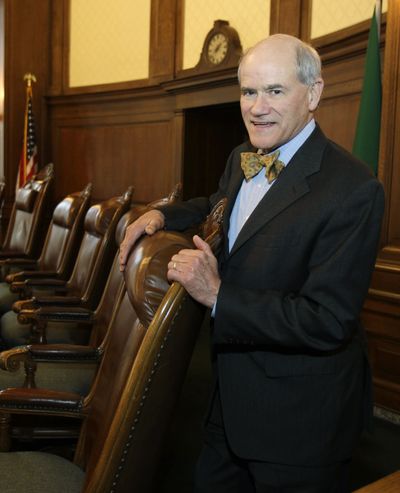Wiggins joins state high court
New justice specialized in appeals work as a lawyer

SEATTLE – Charlie Wiggins has been known to spend his free time searching the Bible for references to “justice” and re-enacting the state Constitutional Convention in costume.
Needless to say, he considers his new seat on Washington’s Supreme Court a dream job.
The bow-tied, 63-year-old appeals lawyer from Bainbridge Island is being sworn in today at the Temple of Justice in Olympia. He beat three-term Justice Richard Sanders by 13,000 votes out of nearly 2 million cast.
“He’s a scholar, he’s a teacher, he’s an advocate for the public good,” said his friend John Ruhl, the former president of the King County Bar Association. “He’s going in there to be now a part of something he has done so much to learn about.”
Wiggins is recognized in legal circles for his sharp grasp of the law, his efforts to strengthen judicial ethics and his eloquent writing. He organized an “urban people’s law school” to teach residents of Seattle’s Central District about practical legal concepts and traveled to Albania to advise judicial officers there in the aftermath of communism’s fall.
But he understands he won the election largely because of who he wasn’t.
Sanders had a history of controversial remarks. Just before the election, the Seattle Times retracted its endorsement of him over recent comments he made rejecting the notion that systemic bias is part of the reason certain minority groups are overrepresented in the prison population.
Sanders carried most of the state, but Wiggins, considered a moderate by lawyers who have followed him, won handily in populous, left-leaning Seattle and King County.
Wiggins is eager now to show the voters whom they elected.
The son of a soldier, he spent parts of his childhood in Alabama, New York, France and Venezuela. Religion was an important part of his upbringing, and it remains central to his life – helping shape his thoughts on justice, though not, he says, his understanding of what the law requires in any given case. His mother was a Presbyterian, his father was a Southern Baptist, and he frequently attended services at nondenominational Army chapels.
He spent two years at Wheaton College, a conservative evangelical school in Illinois. The certitude of many there, who insisted people must either accept Jesus or suffer damnation, turned him off, and he entered a period of doubt that ended only with his father’s sudden death.
He has served on the board of elders at his Presbyterian church on Bainbridge Island, has taught adult Sunday school classes and has incorporated ministries in Seattle. In 1990, using software his wife gave him that allowed him to search the text of the Bible, he began an informal study of biblical justice.
“Justice in biblical terms consists of bringing broken relationships back into balance – restoring harmony,” he said. “I think we’re called on to do justice as a personal matter as well as a civic matter.
“Now whatever that may require – the content of legal obligations – you don’t find it in the Bible. A judge finds it in the law and the Constitution.”
Wiggins has supported Equal Rights Washington, attending the group’s annual dinner auction last year and spending $80 to win the privilege of going to a gun range with pro-gay-rights Republican legal activist Alex Hays.
In its evaluation of Wiggins before the election, Hays’ group, Justice for Washington, said it had concerns that he is tied to the state’s Democratic establishment. But it also said Wiggins would be one of the court’s more competent members if elected.
After Wheaton, Wiggins attended Princeton University on an ROTC scholarship, majored in philosophy and joined the Army. He attended night business classes while stationed in Hawaii and became so interested in business law that he decided to go to law school, graduating from Duke University in 1976 and joining a Seattle firm where he specialized in appeals work.
He enjoyed the intellectual rigor – the research, analysis and variety – involved in appeals cases.
Around the time of Washington’s centennial in 1989, he began researching the state’s Constitutional Convention for a series of articles on the delegates and their debates. Wiggins spent hours digging through old newspaper clippings on microfilm to research the convention.
He and now-Justice Gerry Alexander have re-enacted the debates for legal audiences.
“We wore costumes – the stovepipe hats and cutaway coats,” Alexander recalled. “It’s fun to know about the history of the Constitutional Convention, but it’s also important. People get fired up about the federal Constitution, but they forget about the state Constitution, and there’s a lot more in it.”
Wiggins was appointed to fill Alexander’s seat on the state appeals court in the mid-1990s when Alexander joined the high court, but he lost a special election and returned to private practice.
Wiggins has served on a variety of state bar and court rules committees. A critic of judicial elections, he helped create votingforjudges.org, a website to help voters learn about judges, and he testified before the Legislature in favor of limits on judicial campaign contributions.
Administrative law Judge Anita Crawford-Willis met Wiggins when they organized the “urban people’s law school” together.
“He cares about our community as a whole and people who are less fortunate. He cares about access to justice,” she said.